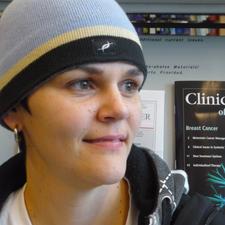“I didn’t recognize you without your hair,” one participant jokes with another who has lost her hair to cancer treatment.
The lecture hall at the BC Cancer Agency is a mixture of laughter and tears as 70 queer women gather for Living the Dolce Vita, an educational presentation on cancer targeted at lesbians, Mar 14.
It’s the first time the BC Cancer Agency has officially provided a forum for lesbians.
The idea for the conference came from Sarah Sample, an oncology social worker at the Vancouver Cancer Centre. For the last 10 years, she has led a support group for lesbians with cancer.
“Lesbians can come together and talk about cancer without any fear of homophobia,” she explains. “The most important thing is that they are in a safe environment. They can talk about how they feel with women who have similar issues.”
Though Sample says the health care system has generally been an accepting, inclusive place for her, there are still service disparities.
“Women have remarked to me that during treatment their partners felt invisible, were referred to as friends rather then partners,” she says. “We are holding this event to continue bringing awareness to the prevention of cancer and support for those living with cancer.”
The first presenter is registered dietician Cheri Van Patten who has worked in oncology nutrition for the last 10 years. “Lesbians have unique health behaviours that are associated with higher cancer risks including increased body weight, smoking and heavy alcohol use,” she says.
“I’ve had a hard time discussing weight issues with queer women,” Van Patten admits. “They say they’ve fought so hard to be their own women and aren’t as open to discussing body weight.”
The fact that lesbians are less likely than heterosexual women to have full-term pregnancies and breast feed, factors that protect against cancer, also increase their risk.
“Knowing that these things exist can make us better practitioners,” Van Patten says.
“Knowledge is power,” says Dr Dianne Miller, who presented on gynaecologic oncology. “There’s a chance here for the lesbian community to come together and support healthy lifestyle changes. The primary change has to come from within the community.”
Deborah Rusch, one of the Dolce Vita organizers, agrees.
“Our community has backgrounds of not being able to come out, hidden lifestyles and drinking as a way of coping, so we need to come together and look at living healthier.”
“If we can start by having less homophobia for teens, then people are going to feel better about themselves and make healthier choices,” adds Dr Karen Gelmon, doctor of oncology and professor of medicine at UBC.
“We don’t want people dying of these cancers,” she says. “We don’t have a handle on what causes breast cancer for an individual woman, but what we can do is start educating young girls and hope it makes a difference.”
Gelmon stresses the importance of public information and a non-intimidating, lesbian-friendly health care system.
“We need to take control of our bodies. Fifty percent of cancers are diagnosed by patients, their partners and their doctors. People can’t be afraid of accessing the health care system,” she says. “We need to ensure there are less negative experiences.
“There is a decrease among lesbians in the upkeep of services like mammography,” she notes. “We need to make sure we have sensitive, educated practitioners.”
“Many of the women at risk don’t access the health care system,” agrees Miller. “It behooves us to try and find ways to make people comfortable.”
Other barriers to quality care include misinformation. “There is a myth that lesbians do not get cervical cancer,” explains Miller. “You can get HPV from same-sex intercourse. I think that if you can provide the knowledge, people can make better choices.”
One of the women who attended the presentation was 36-year-old Tracy Di Venanzo. “When I was 34, I was in the shower doing a routine self-exam and I found a lump,” recalls Di Venanzo. “My spouse and son dropped me off at the clinic and went to the park to play. I went in thinking I was going to have a mammogram and I left with a diagnosis of breast cancer.
“I endured 25 rounds of chemotherapy and I opted to have a double mastectomy with reconstructive surgery. I am proud to say I am a survivor,” she says.
“This presentation was empowering and informative,” Di Venanzo continues. “I came today because any time there are new advances in cancer or any way that I can educate myself and other women, I want to be part of that.”

 Why you can trust Xtra
Why you can trust Xtra


